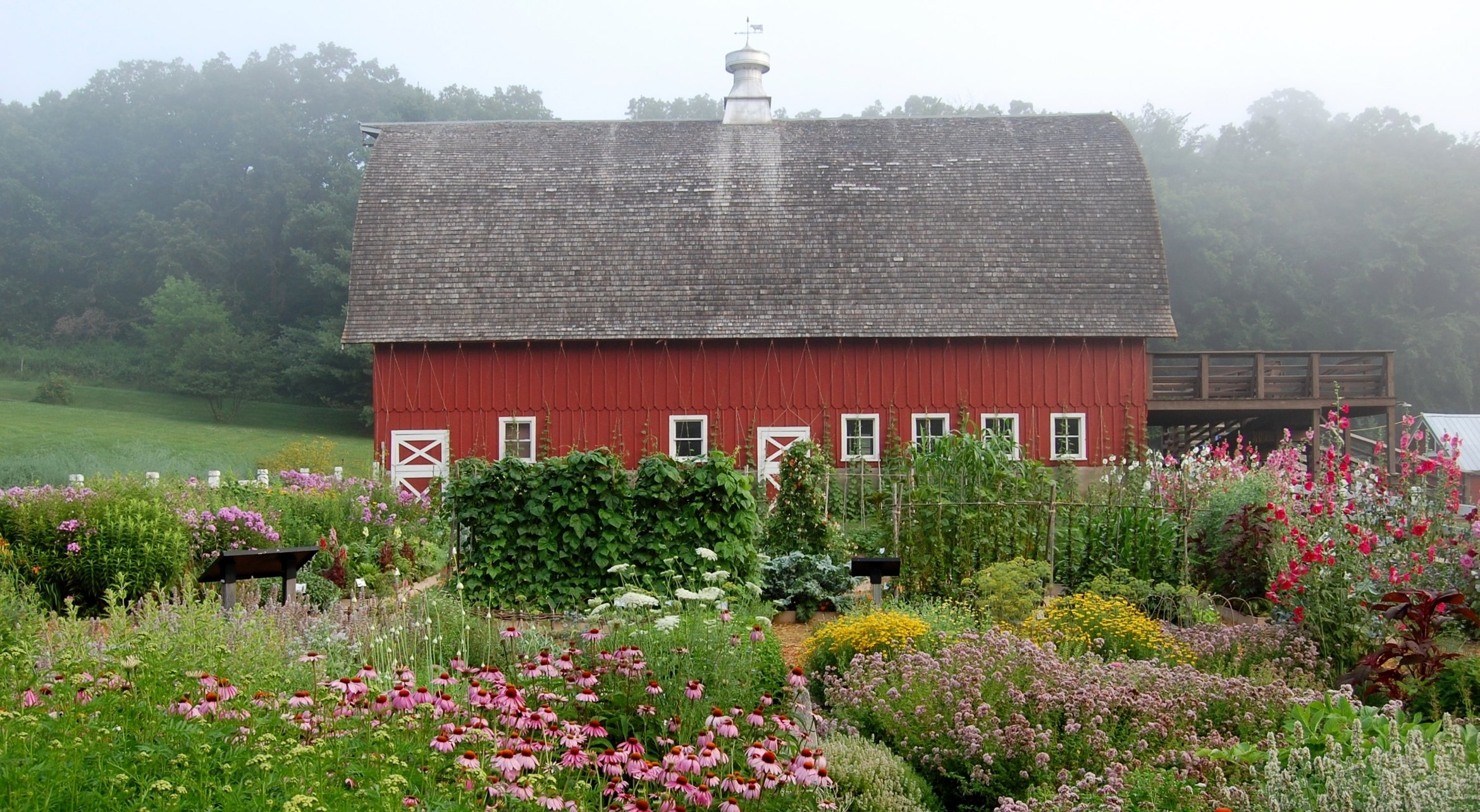Collection to Catalog
/The introduction of the Limited Edition “From the Preservation Gardens” line of seeds to the SSE catalog in 2013 brought the heartwarming, funny, and sometimes curious stories of varieties from our on-site preservation collection into the homes of thousands of Americans. The SSE catalog is responsible for producing an annual infusion of fresh pieces of history along with member favorites.
Read MorePreventing GMO Contamination in Your Open-Pollinated Corn
/Corn (Zea mays) is what we around here consider a ‘promiscuous pollinator.’ That’s because it is an outcrossing, wind-pollinated crop. Because corn relies on wind to carry pollen from the tassels to the silks, the light pollen grains may travel a few miles before finding and pollinating a silk. Your neighbor’s corn can therefore very easily pollinate yours, making it tricky to save pure seed from your open-pollinated corn.
Read MoreThoughts from Jeremy Cherfas
/As the 2013 Seed Savers Exchange Conference and Campout approaches, featured speaker Jeremy Cherfas took the time to give us a preview of what to expect from his talk.
Is Everything Not Permitted Still Forbidden?
By Jeremy Cherfas
The European Union’s current seed laws operate from a fundamentally strange foundation: everything not permitted is forbidden. In other words, if a seed variety is not registered on the Common Catalogue, it cannot be marketed. And marketing covers giving seeds away and swapping them. The new proposals do not change this fundamental principle. Instead, they expand somewhat the list of things that are permitted. Gardeners, for example, can now swap seeds.
These new proposals have provoked an outcry, especially among people who weren’t familiar with the existing regime. People have also rejected the whole notion of rules and regulations concerning seeds. As one person commented on my website, “Also, WHY would you NEED regulation for seeds?”.
Because seeds are fundamentally different from other goods one can buy and sell (except possibly computer software and 3D printers). As Jack Kloppenburg [editors note: Kloppenburg will also speak at SSE's 2013 Conference] has pointed out, they are both the product **and** the means of production. That is, you can eat a seed — possibly inside a fruit such as a tomato — or you can use it to produce more seeds. Furthermore, there is nothing visible on the outside of the seed that gives a clue as to the genes inside, and it is the genes inside that growers are actually interested in, because they determine the final product. As a result seeds have been subject to all sorts of sharp practices over the years.
We need regulations to protect people from fraud, to ensure that when you get seeds of a specific variety, they are what they say they are and that, given the right treatment, they will germinate. These conditions can be taken care of by existing legislation. In England, for example, we have the Sale of Goods Act, first passed in 1893, which says that things must be fit for purpose and of satisfactory quality, with tests for both.
Some seeds need more protection. Commercial farmers, for example, may want varieties bred for their specific needs. Seed companies exist to meet those needs (although some would say they also create many of the needs they meet) and they’re not going to invest in research and development to create a new variety unless they can be reasonably sure that they will get their money back, with a profit. That’s one reason why commercial breeders really like F1 hybrids, because they don’t breed true, and therefore growers who don’t want to get into breeding for themselves have no choice but to buy new seeds each season. F1 hybrids break the link between seed as product and seed as means of production. It is also why commercial breeders have lobbied long and hard for additional forms of protection, such as plant breeders' rights and plant patents.
More power to them, I say. If a grower is convinced that the extra cost of those highly-regulated seeds is worthwhile, why shouldn’t they have the freedom to buy them? But the reverse is also true. If I want to grow a different variety which, for one reason or another, doesn’t even try to meet the standards for additional regulation and protection, why should I not be equally free to make my choice? Of course there’s a risk that the seeds aren’t what they claim to be, or will fail to germinate, but I know that, and I know that existing laws might help me get redress if I really think that’s what I want.
Around the world, that’s possible. There are seed registration schemes, but there is also freedom not to take advantage of registered seeds. Except in Europe where, even if the new proposals are accepted without changes, everything not permitted will still be forbidden.
View the Conference website for more information on speakers, workshops, and activities planned for the July 19-21 weekend.
Our mission is to conserve and promote America’s culturally diverse but endangered food crop heritage for future generations by collecting, growing, and sharing heirloom seeds and plants. Visit seedsavers.org
Debunking the Hybrid Myth
/At the Seed Savers Exchange Conference this summer, Dr. John Navazio 's talk, "Debunking the Hybrid Myth," laid out the hybrid vs. open-pollinated argument. Here's a peek at John's speech, the whole speech is available here. Also, check out Dr. Navazio's new book, The Organic Seed Grower, due out in December.

Why are hybrids favored?
- Once the parental inbreds are fixed it is easy to make the hybrids year after year. You have two parental types and you cross them.
- You can maintain those two homogeneous, very uniform parental types, and every time you want to make some new hybrid seed just plant it out in the field, detassle one, and let the other one make pollen. They’ve been inbred so much they’re very easy to maintain, unlike OP’s that have all that variation. You're seed savers, you’ve seen it, right? Once you've inbred them you’ve basically made it so genetically narrow that you’ll see that the variation is gone. Two uniform parents make a uniform hybrid.
- Companies liked it because hybrids allowed instant proprietary ownership. If you maintained your own inbreds and didn’t give it to anybody else you were the only one that could make that ‘Copper Cross’ hybrid and sell it. Whereas, previously, if you were Ferry Morse and released ‘Detroit Dark Red’ in 1902, within three years every home garden, farmer, and seed company in America had ‘Detroit Dark Red.’ Owners of seed companies loved this little trick, this little wizardry, and the breeders liked it because of the stacking of traits it is actually easier to breed hybrids.
What are the disadvantages of hybrids?
- Inbred lines are genetically narrow and have less adaptation over time than many OP's. That’s why so many of them died from inbreeding depression. You reveal these deleterious traits and narrow their genetic base so much that they’re not adapting and evolving like our older varieties were at the hands of the humans who kept them. In fact, in studies of inbred lines they found that the best inbred lines tend to have less of McClintock’s transposable elements which meant they stayed stable much easier and are the reason the companies loved them so much. It’s anti-evolutionary.
- Hybrids are weaklings. When you grow inbred seed, and I worked at a company where I grew inbred seed, you have to pour on the chemicals, use more water, more fertility, you really do have to baby them. They are prima donnas.
- F1’s focus is often not on the best traits. They’re really focused on the traits that are good for the centralized systems, where we do high input agriculture. It’s the wedding of modern reductionist science and high input, high output. That’s not the way Mother Nature normally works. Vandana Shiva talks about how the focus of science has been reductionist, and it’s all about how can we figure out the input to get exactly what we need to get the right output. At that point you are taking a lot of nature out of the system and the new variation that gives us all of the diversity that we honor so much here today just doesn’t show up as much.
- When you save seed from the hybrids, they don’t breed true, and when varieties are dropped they are gone! You don’t save seed from hybrids, although there’s always an exception to the rule.
- Seed growing has become very centralized and very specialized. A hundred years ago all farmers had knowledge of how to grow seed for most of their top line crops. If you want to talk about loss of diversity, we have lost the people who know how to grow seed. This is as tragic as losing the genetic variation itself.
What are the advantages of open-pollinated varieties?
- They carry variability, and this results in genetic resilience.
- OP varieties can be bred to be tough in all stages. We can select for that in all stages. You can do that with hybrids too, but it’s easier if you have that built in resilience.
- They can be very regionally adapted and continue or always will be adapting year in and year out. We need things like that right now, we’re going through this climate chaos, and so is everyone that I speak to all over the country.
- When you save seed they do breed true, if you followed your isolation, of course.
- Varieties are not lost due to a business decision. Many of the farmers I work with actually went back to OPs' because they were sick and tired of seed companies dropping hybrid varieties that they’d actually come to know and love and learn to cater their system too. All of the sudden it is gone one day.
What are the disadvantages of OP’s?
- They are genetically variable, and not always consistent. I don’t know if any of you get frustrated on the garden scale of not getting as much uniformity as perhaps you would like - some cabbage plants don’t really make a head or something like that. But we can also take advantage of this if we do our selection and upkeep, and learn how to foster that adaptation.
- They are harder to maintain. I can attest to that having bred both hybrid and OP's. It’s much harder to breed something that’s genetically resilient, while keeping in enough variability to keep it strong, and enough selection to make it uniform. It’s a real paradox, how will I get a uniform enough variety but keep the variability?
- How do seed companies keep varieties exclusive? If we’re just growing OP’s anyone can go and grow it. That’s a biggie. And the question that I ask all the seed growers I work with is, "What is the incentive for you to proceed if there is no business incentive?"




















